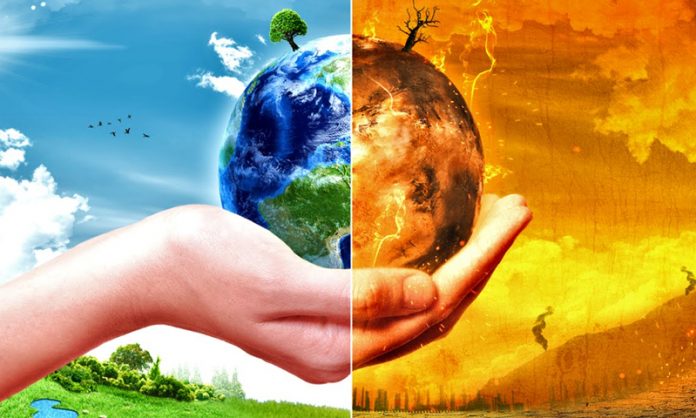A heat wave in 2015 killed 1100+ Karachi citizens in a few days. Is it just a beginning of a horrendous serial of events? Bill Gates warned the world about climate change as an emergency threat. Leonardo DiCaprio pledged the importance of taking immediate action at the United Nations, Obama declared war against climate change, while Dutch citizens sued their government for not taking action on climate change and won the case. Doubtlessly climate change has become the most serious threat to the world today and in both ways, the hottest global issue. And what are we doing?
We are stuck addressing our terrorism, energy and water crisis. Pakistan contributes to only 0.8% of global greenhouse emissions. But the climate, being careless about international political boundaries, threatens Pakistan with a much greater risk and its consequences. After Africa, Pakistan is among top ten most vulnerable countries to climate change. Asian Development Bank reports 2 million people displaced by the addressed consequences in last 2 years. What can it actually do to us? Pakistan is a country whose economy, stability and even the very survival can be endangered by climate change. What can a 4ºC or even a 2ºC warmer world do to us?
Climate change had always occurred naturally, but unlimited anthropogenic activities have accelerated it more than ever. As Mr. Valentine from Kings man(2014) puts it: Humankind infects the planet just as a virus infects it’s host. When greater in number, virus disturbs the host body, which in response develops fever to fight the virus. Earth is heating up likewise. This precedes two results: Either the host eradicates the virus, or the virus eradicates the host. Both ways humankind is going to suffer and only extreme action will avert total destruction.
Climate change with this pattern, already transforming life on earth is expected to cause extinction of 1/4th of the global species by 2050, in hope that we aren’t one of them. In Pakistan itself, many species and wildlife are disappearing and not much attention is paid to address the matter, which is only a drop in the ocean of vulnerabilities.
The basic concept of unnatural climate change is rise in temperature by anthropogenic means which can ultimately alter natural landscape and habitats, threaten wildlife and escalate sea level. These transforming seasons can instigate drought, fire, floods and stronger storms. Higher temperatures incubate heat bred diseases and formulate new diseases.
All of the above mentioned crises are undoubtedly observed in Pakistan within last few decades and not a single effect spared. With an increase of 0.85ºC global annual average temperature in last 100 years, Pakistan recorded excruciating 53.5 ºC in 2010. This can result in maximum and minimum temperature increment in winters, resulting in shorter winters and longer summers. More heat will increase photosynthesis which can cause problems as crop life cycle will hasten and mature without reaching appropriate size. This phenomenon is seriously observed in wheat production in many South Asian countries including Pakistan, resulting in significant loss in the yield.
Water shortage will be Pakistan’s greatest concern due to climate change. With a diversified but changing climate and growing population on 1.6% growth rate, Pakistan’s demand of water is continuously boosting. The irrigation dependant 80% of Pakistan’s agriculture and 182.1 million people are already enough to cause water crisis in Pakistan. Climate change directly effecting temperature, precipitation rate and squandering glacier runoff potentially threatens to cause severe water shortage in Pakistan. Pakistan’s per capita river water availability has decreased from 5260 m3/annum (1951) to just 1000-1066 m3/annum (2008).
Increase in heat causes more water to evaporate from the oceans, alters the cloud formation, wind direction and rainfall patterns. Half of the annual rainfall occurs in July and August at an average of 255 millimeters, whereas this year at the verge of July government is deciding to set off artificial rain in Karachi. Rainfall irregularities caused ruthless droughts in 1999-2002 followed by heavy rainfall during 2003-2005. This directly regulated country’s economy. Glacial regions of Pakistan have unfortunately experienced an astonishing 1.5°C rise in temperature.
Hindu Kush-Karakoram-Himalayan glaciers are vulnerable to global warming and trans-boundary pollution sources. This can increase water inflows into the Indus River System (IRS), but wouldn’t be ultimately beneficial. The arid region of Indus Delta is fertile but intensely heated during summer. It’s expected to become prey of climate change with severe droughts, floods, sea water intrusion and coastal erosion. Melting of HKH glaciers due to temperature rise would cause freshwater run-off all at once, which gradually recharges Pakistan’s rivers every year, leaving behind severe water crisis. Such irregularities in water run -off amplified by deforestation can result dreadful floods, like in past decade Pakistan has been experiencing flood almost every year, marking 2010-2011 specially as the biggest historical floods since Pakistan’s inception, which entirely affected 25.3 Million people, 3.1 million homes and millions of acres of arable land.
Arabian Sea which is important to Pakistan is reported to be affected. Reports conclude that it’s warmer than Bay of Bengal now, which was formerly warmer in comparison. Such warming can eventually cause ocean acidification to destroy Coral Reefs which are very important components of aquatic food chain and enormous producer of Oxygen. This is directly affecting the aquatic life, and indirectly land.
Forests are also considered as check dams. Pakistan’s forests are disappearing faster than anywhere in the world and dwindled down to only 2%. The merciless chopping of timber for money will only bring Pakistan loss. Recent daunting floods in Pakistan are also considered to be on account of deforestation, as they serve as soldiers to a country during times of flood, tsunamis and landslides. They don’t only operate as habitat for many species but also gigantic absorber of heat and massive amount of Carbon dioxide produced by human activities, both of which are great causes of global warming and climate change.
Pakistan is reported to be affected by sea intrusion due to sea level rise. A report by National Institute of Oceanography (NIO) declares threat to Karachi and Badin-Thatta to drown in sea by 2050. A WWF study reveals that sea water has impinged 1km inland in past 30 years and expected to greatly increase. The problem is that once sea water enters a land, it leaves the soil potentially dead and useless for agriculture. Sea intrusion in Indus delta will affect agriculture. Indus Delta mangroves and estuaries, which are the breeding grounds of many aquatic species, are disappearing faster than ever. Karachi, being the financial hub, on this account is at high risk of sea intrusion as some parts of Malir are already swallowed by sea and this year a cyclone is predicted as Pakistan Weather Portal notified to take serious precautions at coastal areas. Wholly 2.2M acres of Pakistan land has been taken away by sea.
Agriculture is the potential basis of Pakistan’s economic development, which will be badly affected resulting in minimized growth yield. While 1.2M acre land in Indus Delta is covered by sea now, 4.5 Thousand hectare of agricultural region in Humbas Wali Creek and 0.5M hectares fertile land in Thatta is drowned by saline water, threatening 400,000 lives.
Apart from all these obviously not less important potential hazards, heat itself can directly affect life and environment. From the delicate fish in the seas to securitized humans, all form of life can be disturbed. After a record breaking heat wave at Meon-jo-Daro (53.5 °C) in 2010, now Karachi fell prey to one of the 6 most deadly heat waves forecasted this year, which took away more than 1100 lives in a few days. PEPA reported it to be a climate change concern as heavy traffic and industry of Karachi, along with expressed chopping of trees to develop roads and Urbanization are enough reasons to conclude it.
Climate change on account of species’ extinction has wiped out many important animals including swamp deer, tiger, lion, Indian Rhinoceros, Asiatic Cheetah, Indian wild ass, Hangul and countless other small animals. This is caused not only by heat but also by wildlife destruction, sea intrusion, habitat destruction, droughts, floods and unavailability of food. All of these reasons are dynamically related to climate change.
If the current situation prevails the annual temperature is expected to rise by 3° by 2040 and twice of that by 2100. This implies that we are in grave danger. If things aren’t reversed or at least slowed down then agricultural sector will be the most affected, on which our economy directly depends.
To minimize the impacts Pakistan needs to take urgent actions. We cannot execute anything without recognizing climate change as a threat at National level. Unfortunately current scenario illustrates that people are unaware. 40% Pakistanis according to a survey doesn’t know what climate change is, while only 15% considers it a peril, which leaves Pakistan most ignorant to climate change in South Asia. Ignorance leaves them with no other option than to blame the government for everything that ever happens. It’s a crisis that the whole world shall face, rich or poor, accordingly whole world should stand against it to play their roles. It’s seemingly the next revolution on our way and a warning that we should keep our devices ready.
Government needs to invest in research and solutions, hi-tech calamity monitoring, building food and water reserves, mitigation in agriculture, farmer training, conservation of mangroves and forests, massive plantation and most importantly spreading awareness. To me it’s unfair to lay the entire responsibility on the government and wait for their action. It’s our country, our responsibility! Utmost efforts should be made by each and every individual, not as a contribution, but as an obligation! Each and every citizen of this state ought to learn about climate change, as I hold the “Knowledgeable citizens” more responsible to this obligation than the government. People need to be provided high quality information on impacts of climate change and reminded that each one of them has a right and power to do something against it. Even if it’s just planting a tree.
By Faizan Ali





